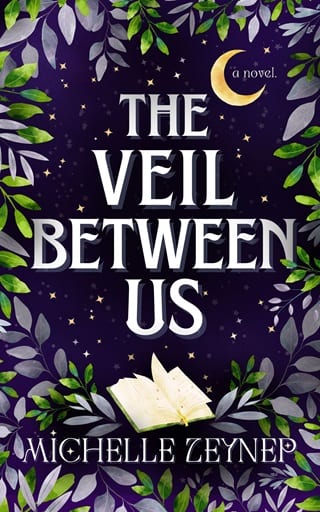12. Chapter 12
Chapter 12
H enry and I spend a week of mornings searching for the missing book. Now that we have a little piece of something to push us forward, it feels like the clock has sped up, ticking off the hours and days until my summer ends and I need to leave. Every day, I get more attached to him. Every day I question why I’d want to break the curse when it’s clear that breaking the curse means helping him cross over to the other side, into the great unknown of death, moving him into a world where I will never see him again.
But Henry is a ghost. He’s already dead.
Telling myself that has nearly ceased all significance, but still I try to hold on to that knowledge, little good that it does me.
We’ve shifted our mornings from scanning and transcribing and organizing for my family project to sorting through every box of books in either of our possessions. During the hours, Henry asks me a million questions about my own life, but I’m sick of talking. I want to know more about Henry’s life.
“Lives,” he tells me whenever I’m impressed by his accomplishments—which is often. “I’ve lived nearly five of them, although only one has been real.”
“Well you haven’t slacked, that’s for sure.” Languages are the most impressive of his accomplishments—Dutch, from his immigrant grandparents; French and Latin, from school and for fun; Russian during the Cold War; Spanish, because it’s what his family learned in the local schools over the past few decades; and, most recently, Mandarin, although he regrets that no language app or online video chat will ever be able to check his use of tones.
His three degrees, obtained online over the past twenty years, might be the next most impressive, but he doesn’t care about them. “They’re just ways to pass the time. They give me no significance, give me just the bare threads of a purpose, and I’ve hardly used them at all.” When Karl first got sick a decade ago, before his cancer went into remission the first time, Henry took over most of his work as an architect, submitting projects and plans under Karl’s name. “He couldn’t lose that job, so I did it for him. You know, for the health insurance,” he had explained wryly. He didn’t have a degree for that work, but he joked that he learned “on the job.”
“I still find it impressive,” I inform him. We are on our way to search through the pole barn—our last potential location of Mallory’s book.
“If I had to experience any hardships other than intellectual ones in order to obtain all of this knowledge, maybe I’d be proud,” Henry tells me.
“I think you should be proud regardless. Many people spend their whole lives not doing any of those things.”
“But they also have other things to worry about. Family, illnesses, commutes, jobs they hate but have to do for the health insurance. I essentially have unlimited free time and no obligations other than those I’ve held myself to. My life isn’t a real life, Rency. It has no value at all.”
“I think you have value,” I tell him, heart clenching in my chest. “Don’t you think all people do?” It hurts me to think that he doesn’t see himself as someone worth anything.
“Of course I do.” We pause in front of the door, and I watch as he types a code into the keypad of the pole barn, deadbolt whirring as it retracts. He turns to face me, and his eyes are serious. “The problem is that I’m hardly a person at all. Perhaps this is my soul, materialized here before you. If so, I hope that it’s experienced a measure of sanctification while trapped here between worlds, but regardless of that, it has no purpose. I have no purpose here. I’m disconnected. Trapped. The afterlife is where the dead are meant to go. Where I’m meant to be.”
It kills me to agree. “I understand,” I tell him. “I just don’t want you to… I don’t want you to think badly about yourself. As a person. ”
His hand rests on the doorknob, but he doesn’t twist it open. “Believe me, Rency. I’ve thought everything someone could possibly think when it comes to who I am. Who I was. Who I would have become but never will. I’m at peace with all of that, as much as anyone could ever be.” His sage eyes watch me, looking for confirmation that I understand what he’s telling me. I try to keep my expression devoid of the emotions that rip through me. I must not be successful, though, because Henry’s expression softens just slightly. “You need to be at peace with that, too.”
I nod, but I can’t agree out loud.
I’m not at peace with it at all.
The hours searching for his aunt’s magic book are blissful torture. I get to spend time with Henry, but at any point that time could result in an ending that twists my gut into knots. I’ve lost my appetite, feeling sick at the idea of eating. I can’t believe I’m contributing so fully to something that will rip me apart. I can’t shake the feeling of connection between us, of more .
Don’t be selfish , I tell myself. Henry doesn’t want to spend a hundred more years here, trapped in this bizarre veil between worlds.
And yet, the veil between us is the only thing keeping me connected to him. It’s a contradiction: the very thing that holds him here is the very thing that means we cannot ever be together.
There is no peace in that for me.
I don’t know what I assumed was in the pole barn— tractors and toolboxes, I suppose. It certainly isn’t the neat, open space that Henry welcomes me into. A flick of the lights reveals a cleanly swept floor, organized buckets of paint and stain and polyurethane, and at least a dozen pieces of furniture in various states of being refurbished.
“Wow,” I marvel, approaching one of the pieces closest to me. It’s been stripped of whatever paint or finish had been on it, leaving just the intricate inlay visible. I squat down so I can see the pattern better. “Were these Karl’s?”
“Yes. And mine. I was a carpenter, you know. Before I….” His arms are crossed over his chest, and he’s looking away from the piece, over towards a different area of the barn. “Anyway, I’ve picked it up here and there, and after Karl retired and then after his wife passed away, we restored pieces together.”
“That sounds nice,” I say. Really what I want to say is, “I’m so sorry he’s gone. I’m sorry you spent this past year alone.”
“It was. Karl was a nice guy. And we were a good team. I couldn’t range too far, obviously, but he’d text me pictures at the garage and estate sales he would go to so I could help pick our pieces. We’d fix them up and then sell them online, or locally.”
“At the antique store, in the alleyway arcade?” I ask, thinking of those mid-century modern pieces I had loved but couldn’t afford.
“That’s right,” Henry says, surprised. “Quite a few of those are ones I did. Have you seen them there?”
“Yes. They’re beautiful.”
He blinks at me, slowly smiles. “Well, you can have whichever you’d like. They are on consignment, so I can take them out of the shop’s booth whenever I’d like.”
I flush with pleasure—the idea of having something so lovely and carefully restored by Henry to keep near me—but I shake my head. “I couldn’t possibly. Don’t you need the money to, I don’t know”—I stand, waving an arm around the barn—“pay your taxes? Your phone bill?”
“Well yes, but I’ve been dead for a long time and have very few basic needs. I think my savings will survive the loss of a few pieces of furniture.”
I feel immediately silly. “Of course. You’re a ghost.”
Henry laughs. “That I am, Rency. But your name and mine are on paper together, the signatures side by side. What’s mine is yours, for however long that lasts. So pick your pieces, whatever they might be.” He doesn’t give me any time to process that comment, so romantic in sentiment and pragmatically delivered, instead encouraging me to follow him deeper into the barn. “Come on, let’s go up to the loft. The storage boxes are up there.”
It’s comments like that that make it impossible for me to create the emotional distance I need. Henry drops them in occasionally, little phrases that show his acknowledgment of this strange cosmic connectivity we somehow entered into. I try not to hold them close to me, try not to think about them as I lay in bed at night, but it’s getting harder and harder every day. I’ve almost given up trying to not indulge in them. The only thing holding me back from caving entirely is the knowledge that in one month, curse broken or not, I’m moving back to my own house, back to the town where I grew up to work the safe, secure job I have been for the past three years.
The same safe, secure life I had before Henry.
The stairs don’t creak as we climb, and the top of the steps opens up into a skylight-lit office. Henry points out the spaces in the eaves where there are small cabinet doors. “The storage is all tucked away,” he says. “Karl was a little Type A. I doubt the book will be here, but the old family storage is in these.” He gestures to a section of cabinets and we begin pulling out the relevant boxes.
Henry is right: the selection is minimal. There are five bins, each filled with roughly two decades of photos and knickknacks and congratulations cards—even some baby teeth. Henry’s era is the one with the most items in it.
“It’s my fault, I think,” he says as we spread the box out onto the available table. “First, I died and they didn’t want to get rid of anything. Then, after a few years, a few of them started to be able to see me and I think they felt like they were throwing away my things, right in front of me.” He passes me a Lipton tea tin, looking away while doing so.
Inside the metal box there are a jumble of small items: a few metal toy figurines, a newspaper clipping, a cut of russet baby hair tied with a snip of ribbon, a birthday postcard, embossed, with the script, “Wishing you volumes of good wishes” next to a painting of a stack of leather-bound books.
“Before I got the job with my uncle, I spent a lot of time reading,” he says, not even having to glance over at me to know what I was looking at. “After I died, even more.” He’s not watching me look at the scraps of his childhood, not watching me trace the raised lettering on the birthday card.
“I like to read too,” I offer.
Henry huffs out a laugh. “I know.” He’s seen the books piled next to my bed, the way I’ve browsed his own ghostly library, shelves lined with tomes he’s pushed into his ghost world. We’ve talked about books, too, so it’s a silly thing to say, but sometimes when I’m with Henry, my brain seems overloaded by his mere existence.
My ears burn as I set the tin aside, looking back into the box. There isn’t anything here that we’re searching for, although Henry identifies a few of the items in the larger box as items that once potentially belonged to his aunt.
By the time my phone chimes, letting me know that my grandma is due to arrive home soon, it’s hard not to feel discouraged. We’re running out of places to look, and I’m running out of time. Plus, this afternoon I’m driving out to Rapid City to see Caroline and spend the weekend with her, shopping and planning for her wedding, so saying goodbye to Henry today puts me in a particularly strange state of mind .
That’s how I justify wrapping my arms around him after he walks me back to my grandmother’s house. We have been strictly no-contact ever since the night he pulled me against his chest and I ran my hands through his hair and our noses were close enough that they almost touched and—
Well, and we decided that touching was not a good idea, no matter how long it had been since Henry could hug or no matter how much I felt myself pulled to him.
Saying goodbye, though, broke my tenuous control. I couldn’t help myself, didn’t even process that I had broken our rules until Henry tucks his chin against my hair, chuckling as he returns the hug.
“Sorry,” I say, pulling back.
His arms tighten around me, keeping me pressed against him. “No,” he said. “It’s fine. Good. It’s good. I was just surprised.”
Saying goodbye to you scares me , I want to tell him. It feels too close to… to a longer goodbye. Of course, I don’t. “I’ll see you in a few days,” I remind him, giving him a slight squeeze before letting him go.
If he wasn’t a ghost, would he smell like wood chips and furniture polish? Like the pine forest he lived in, like the old books stacked up to the rafters in the upstairs of his little house in the woods?
“Have fun. Be safe. Don’t let Caroline talk you into doing anything too crazy.” He lets his arms drop but doesn’t step back, instead meeting my eyes from mere inches away .
“Feeling protective?” I ask, teasing.
His eyes narrow just a bit. “Yes.”
I pat his arm. “I’m an independent girl. I can take care of myself, don’t you worry.”
He reaches up, tucking a curl behind my ear. “Well, you’re my girl, technically.”
My blood thumps in my ears, heart racing in my chest. “‘Technically’ is hardly a ‘technically’ considering the circumstances.”
“Hmmm,” Henry muses, eyes on my eyes, my lips. His hand is still at the back of my neck, resting there as if it was as normal as anything. “I suppose you’re right. Still, I wouldn’t want anything to happen to you, my technical wife or not.”
“I’ll be careful. And I’ll see you on Monday.” It’s a whispered promise.
“Good,” he replies, hand trailing down my arm before he steps away. A surprisingly boyish grin breaks the seriousness of his expression. “Don’t miss me too much while you’re gone.”
 Fullepub
Fullepub 



